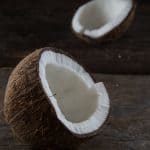Can essential oils help stop coughing fits? If so, what are the best essential oils for cough, sore throat and colds?
The average length of a cough is 18 days. That’s a lot of irritation on the lungs. Not to mention coughing fits are annoying, robbing your quality of life.
Up until recently, antibiotics were dispensed like candy for colds by doctors. [SOURCE]
However, there is now more awareness that antibiotics are, at best, ineffective for cough- and cold-causing viruses. And at worse, the overuse of antibiotics has led to the increase in so-called superbugs. Superbugs are drug-resistant bacteria.
According to the Centers for Disease Control, each year in the U.S., over 2 million people become infected by a superbug. And over 23,000 people die from them. [SOURCE]
Even over-the-counter cold remedies can be problematic. They can cause side effects, and according to the Mayo Clinic, they do not shorten the duration of a cold. [SOURCE]
In light of this, more people are turning to all-natural remedies such as essential oils for cough and colds. Some EOs have a solid reputation for having strong antibacterial properties. But if colds are viruses, are EOs strong enough for relieving cold and flu symptoms? Can they also relieve sinus infections, sore throats, and dry cough? Read on to find out….
Do essential oils cure cough and colds?
Despite the fact we have sent man to the moon and mapped the human genome, there’s still no cure for the common cold. However, it’s possible that essential oils can shorten the duration of a cold.
Since prehistoric times, plants have been used to treat cold symptoms like coughing. There’s even some research suggesting essential oils for cough and colds offers some relief.
Let’s take a look at some of these therapeutic plant oils….
According to the Updated & Revised Essential Oils Expanded guidebook, here are the best oils for cough:
- Cinnamon
- Myrrh
- Lemon
How do you use essential oils for coughing?
The Updated guide suggests mixing 2 drops each of the oils above with coconut oil. Coconut oil is a so-called carrier oil. Carrier oils help dilute the essential oils, which are very concentrated.
Applying essential oils directly to the skin without diluting with a carrier oil can severely burn your skin. (Almond, olive and jojoba oils as well as aloe vera are also popular carrier oils.)
However, the Updated guide recommends actually ingesting this blend twice a day.
Is it safe to ingest essential oils for cough?
Ingesting essential oils (EOs) is a bit controversial. Some people believe it’s perfectly safe. Other maintain there’s just not enough long-term research to prove oils are safe to ingest.
Naysayers believe that these powerful plant compounds are too concentrated to consume; they may cause health problems such as ulcers.
Without doubt, most natural health experts recommend avoiding ingesting the oils without a carrier oil. One way to ingest the oils for coughing is this: place the drops in a veggie capsule that’s filled with olive oil or coconut oil. This essential oil company recommends ingesting no more than 12 drops of oil in a day.
Following the Updated Guide’s recommendation above, the 2 drops each of cinnamon, myrrh, and lemon twice a day falls within this limit.
Perhaps the safest way to use EOs for colds and coughs is via steam inhalation.

How to inhale essential oils for coughing
- Boil a couple cups of water in a pot.
- Pour a few drops of the oils in.
- While you’re waiting for the water to boil, grab two chairs and a large towel.
- Place the chairs facing each other, just a few inches away.
- On one of the chairs, place a towel.
- Once the water is boiling and you’ve added the oils, place the pot on the towel.
- Sit down on the opposite chair.
- Drape the towel over your head and around the pot.
- Your head should be about a foot away from the pot.
- Take slow, long deep breaths for a minute or two.
- Do this a few times a day.
More essential oils for colds
The Guide also recommends this topical formula:
- Peppermint
- Eucalyptus
- Melaleuca (tea tree oil)
To use this blend, apply 3-4 drops on the chest and throat as needed. If you have sensitive skin, make sure you dilute the blend in a carrier oil.
Is there proof the best essential oils for cough actually work?
There is. But it’s limited. Here’s what we know based on small preliminary studies….
- This review of chamomile says: inhaling steam with chamomile extract has been helpful in common cold symptoms.
- Wild oregano oil (carvacrol) relaxes the trachea and bronchi (of guinea pigs), according to this study.
- Menthol led to a 56% reduction in cough frequency while camphor reduced it by 33% in this research (also on guinea pigs).
- Research on a spray containing two varieties of eucalyptus, peppermint, rosemary, and Origanum syriacum (aka hyssop or Lebanese oregano) applied 5 times a day for 3 days led to significant and immediate improvement in symptoms of upper respiratory ailment.
In the study on the spray, the main outcomes were assessed by the severity of the most debilitating symptom (sore throat, hoarseness or cough). The study involved 60 patients (humans, not guinea pigs!). Of the 60, 26 took the spray and 34 were in the control group (did not receive the spray).
After 20 minutes of using the spray, participants in the experiment group reported an improvement in their symptoms than the placebo group. One of the oils in the study–eucalyptus–was previously researched and concluded to be very effective for treating chronic bronchitis.

Do diffusers work for cough and sore throat?
Maybe. Maybe not. There simply isn’t any research that shows that diffusing oil in a room can improve a cold or lessen the frequency or intensity of coughing.
It may be more beneficial to diffuse the oil and apply topically as a chest rub.
In addition, you can use the steam distillation process as described above. This method is particularly useful for a stuffy nose.
And another thing that might work better for a cough is taking a warm water bath with EOs.
As for a sore throat, gargling with salt water and lemon is still considered the go-to remedy. (You can also gargle with a safe-to-ingest essential oil if you’re not concerned about the lack of stuides on ingesting essential oils.)
That being said, run your oil diffuser for an hour or so in your bedroom before you go to sleep. This may help reduce the likelihood you’ll wake up in the middle of the night with a coughing fit.
Essential oils to diffuse for cough and colds
Speaking of using your diffuser to help shorten the duration of a cold, you can make your own blends. Or, to save time, you can buy a blend.
If you’ve never used a diffuser before, they basically act the same way a humidifier does. Most people who are new to using EOs start with a few drops of a particular essential oil. The most common ones include lavender oil, peppermint oil, eucalyptus oil and lemon oil.
As mentioned above, peppermint and eucalyptus are supported by modern research to help fight coughs. Lavender and lemon also have proven anti-viral properties.
These oils have been used throughout the ages for colds. In a basic oil diffuser, you can put about 5 drops of each oil. Don’t forget to fill the diffuser with distilled water up to the max water line.
If you want to buy a blend, keep in mind most EO companies drastically mark up their prices. The average profit margin for a restaurant is only about 3 percent. In comparison, some EO companies mark up their prices by several hundred percentage points.
One company, Edens Garden sells a blend for only $7.95 called “Fighting Five,” which includes:
- Lemon
- Cinnamon Leaf
- Moroccan Rosemary
- Clove Bud
- Eucalyptus Globulus and Eucalyptus Radiata
As with any other EOs, you’re supposed to dilute this blend with a carrier oil before topical use. It’s also recommended you avoid sunlight or UV rays for up to 12 hours after applying this blend to your skin.
Essential Oils for Congestion
Have a stuffy nose? The good news is that some of the most popular essential oils can help you breathe better. We’re talking about eucalyptus, peppermint and tea tree oils.
Eucalyptus oil has strong anti inflammatory properties (it also has anti viral action). Peppermint also helps lessen inflammation. This makes these two oils help relax the airways. As for tea tree, it not only may help make your cold feel better, it may also help relieve sore throat.
To use these three oils, you can try the steam distillation process mentioned above. You can also combine these three oils and diffuse them.
Essential Oils for Dry Cough
If your cough is unproductive, meaning, no phlegm is expectorated, you have a dry cough. Dry coughing fits often occur after a sore throat. The same oils already mentioned above may also relieve dry cough. Peppermint, eucalyptus and tea tree, along with oil of oregano as well as clove are some of the best.
Are essential oils safe for kids with coughs?
For newborns, no. EOs are not recommended for babies. Don’t think that if you add just a few drops to a diffuser is perfectly safe. The reason why is the immune systems of newborns are too sensitive for these highly-concentrated plant chemicals.
There simply aren’t enough studies to conclude EOs for kids are safe. We know they’ve been used for thousands of years. But before you go rubbing eucalyptus oil on your child’s chest, make sure you seek the advice of an expert such as an aromatherapist or naturopath.
At the very least, reduce the amount of drops you would normally use. Test a very small amount on your child first. This is especially true for chest rubs. Eucalyptus actually has a chemical (1.8 cineole) that can be hazardous for children.
However, for children as young as three, an essential oil educator, Robert Tisserand, says that eucalyptus globula and radiata can be safely diffused (1-2 drops) and applied topically at a concentration of 0.5% (2 drops in 4 teaspoons carrier oil).
What do you think are the best essential oils for cough and cold? How do you use them? Leave a comment….






